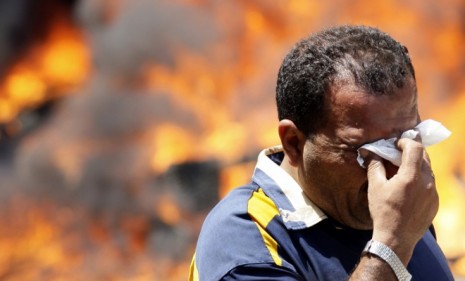Egypt: Is the new regime as bad as the old?
The tear gas and rubber bullets flew again in Tahrir Square, as thousands of protesters of Egypt's new government clashed with police this week

Rocks, tear gas, Molotov cocktails, and rubber bullets flew in Cairo's Tahrir Square again Tuesday night, in the largest clash between police and protesters since President Hosni Mubarak's ouster in February. There are varying accounts of what exactly sparked the bloody confrontation — though all agree it started outside a memorial service at the Balloon Theater, between police and families of the January uprising's "martyrs." When the violence ebbed Wednesday, at least 1,000 protesters were injured, and the interim military-led government was scrambling to reassure Egyptians that the transition to democracy is still on track. Have things really changed since Mubarak's fall?
The new regime has failed the people: "If it hadn't been clear already," the new clashes in Tahrir Square are a stark reminder that "the military junta running Egypt... is doing a terrible job," says Blake Hounshell at Foreign Policy. Even though the aims and origins of the "nasty street battle" are murky, it's crystal clear what's behind it: "Anger is mounting" at the slow pace of justice and reform.
The Week
Escape your echo chamber. Get the facts behind the news, plus analysis from multiple perspectives.

Sign up for The Week's Free Newsletters
From our morning news briefing to a weekly Good News Newsletter, get the best of The Week delivered directly to your inbox.
From our morning news briefing to a weekly Good News Newsletter, get the best of The Week delivered directly to your inbox.
Actually, it's the rioters hurting democracy: The protesters' "frustrations are indeed legitimate," but change doesn't happen overnight, says Gulf News in an editorial. All Egyptians should "focus on the bigger picture": The interim government needs to "maintain a level of security and stability in order to be able to move forward." Rioting not only prolongs military rule, but it's also "a major source of distraction for all Egyptians who are yearning to return to normal life."
"Egypt's stability at a critical stage"
The junta still has to prove itself: The military regime believes a "great silent majority" of Egyptians just want "things to 'get back to normal,'" says Steven Cook at the Council on Foreign Relations. But that doesn't appear to be true, and Egypt's leaders are "taking a big risk when they use force against protesters." In post-Mubarak Egypt, this isn't intimidating people, but galvanizing them. And since much of "Mubarak’s regime remains largely intact," the burden of proof for change lies with the junta.
"Tahrir Square: The smell of tear gas in the morning"
A free daily email with the biggest news stories of the day – and the best features from TheWeek.com
-
 Political cartoons for February 1
Political cartoons for February 1Cartoons Sunday's political cartoons include Tom Homan's offer, the Fox News filter, and more
-
 Will SpaceX, OpenAI and Anthropic make 2026 the year of mega tech listings?
Will SpaceX, OpenAI and Anthropic make 2026 the year of mega tech listings?In Depth SpaceX float may come as soon as this year, and would be the largest IPO in history
-
 Reforming the House of Lords
Reforming the House of LordsThe Explainer Keir Starmer’s government regards reform of the House of Lords as ‘long overdue and essential’
-
 The billionaires’ wealth tax: a catastrophe for California?
The billionaires’ wealth tax: a catastrophe for California?Talking Point Peter Thiel and Larry Page preparing to change state residency
-
 Bari Weiss’ ‘60 Minutes’ scandal is about more than one report
Bari Weiss’ ‘60 Minutes’ scandal is about more than one reportIN THE SPOTLIGHT By blocking an approved segment on a controversial prison holding US deportees in El Salvador, the editor-in-chief of CBS News has become the main story
-
 Has Zohran Mamdani shown the Democrats how to win again?
Has Zohran Mamdani shown the Democrats how to win again?Today’s Big Question New York City mayoral election touted as victory for left-wing populists but moderate centrist wins elsewhere present more complex path for Democratic Party
-
 Millions turn out for anti-Trump ‘No Kings’ rallies
Millions turn out for anti-Trump ‘No Kings’ ralliesSpeed Read An estimated 7 million people participated, 2 million more than at the first ‘No Kings’ protest in June
-
 Ghislaine Maxwell: angling for a Trump pardon
Ghislaine Maxwell: angling for a Trump pardonTalking Point Convicted sex trafficker's testimony could shed new light on president's links to Jeffrey Epstein
-
 The last words and final moments of 40 presidents
The last words and final moments of 40 presidentsThe Explainer Some are eloquent quotes worthy of the holders of the highest office in the nation, and others... aren't
-
 The JFK files: the truth at last?
The JFK files: the truth at last?In The Spotlight More than 64,000 previously classified documents relating the 1963 assassination of John F. Kennedy have been released by the Trump administration
-
 'Seriously, not literally': how should the world take Donald Trump?
'Seriously, not literally': how should the world take Donald Trump?Today's big question White House rhetoric and reality look likely to become increasingly blurred